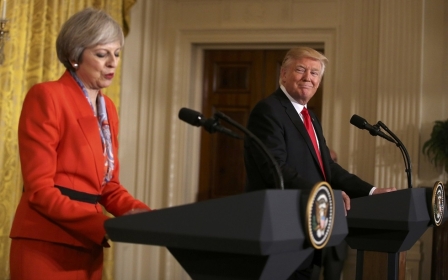Trump’s Middle East policy: A bad case of whiplash

Donald Trump’s Middle East policy, such as it is, can be parsed as a bad case of whiplash. During the early stages of the presidential campaign, he had the temerity to tell the Republican Jewish Coalition that, as opposed to most other candidates, he believed the president should be an honest broker between Israel and Palestine. Later, after he won the GOP presidential nomination, he morphed into a more conventional candidate who toed the AIPAC line on all issues related to Israel. He promised the US embassy would be moved to Jerusalem. He expressed scepticism about supporting a two-state solution. All these were music to the ears of Bibi Netanyahu.
After taking office, he didn’t disappoint: His chief Middle East operatives, Jared Kushner and David Friedman, are both Orthodox Jews known to support Israeli settlements and the far-right Likud government. The family foundations of both support Beit El, a large Israeli settlement built on Palestinian lands. When another Trump representative, Jason Greenblatt, visited the region, he never once mentioned the “cursed” words “Palestinian state.”
Yet somehow, without offering a shred of carrot to the Palestinians, Trump believes that by a magical act of conjuring, he will solve the Israel-Palestine conflict. It’s as if he sees the Palestinians as a stage prop rather than a people deserving of full recognition and equal rights to Israelis.
Regarding Syria, Trump has, if anything, careened even more recklessly from one pole to another. In his latest policy iteration, Trump commanded his generals to launch 59 Tomahawk missiles against the Syrian airbase from which war planes allegedly launched a poison gas on the village of Idlib, killing 80 civilians. The US attack was meant as “punishment” and a warning to Syrian president Bashar al-Assad that the use of chemical weapons in the conflict would not be countenanced by his administration.
This contradicts Trump tweets from 2013, which excoriated then-President Obama for threatening US intervention after a previous incident in which Assad was accused of using poison gas on his own citizens:
The problem today is that Trump has no coherent policy regarding Syria. That means no one, including Assad, has any way of knowing what the US attack means. As recently as 31 March, the White House talked of “accepting the political reality” in Syria. We appeared to accept the notion that the Syrian president would continue ruling his country for the foreseeable future. There was serious talk of working with Russia toward a brokered settlement.
This week, UN ambassador Nikki Haley reverted to the Bush-Cheney era regime change rhetoric espoused about Iran. Russia has reverted to Public Enemy Number 1. The Russians could be forgiven for sensing a bit of whiplash themselves. They were none too happy with the Trump turnabout and cancelled a memorandum which permitted Russian and US forces in the region to coordinate their activity so they didn’t accidentally engage militarily.
If the US supports regime change, then how do we propose to get there? Are we willing to put boots on the ground? Are we going to join with other Sunni states like Qatar and Saudi Arabia, who are funding some of the most notorious of IS militias in Syria? If we are not willing to take this route, then what do we want and what are we willing to do to get it?
Mercenary’s rendezvous with Putin pal on Trump's behalf
The Washington Post reported on one of the more bizarre bits of Trump Middle East freelancing. Just before Trump’s January inauguration, former Blackwater CEO, Erik Prince, contacted his royal UAE host (he’s living there to avoid legal fallout from numerous lawsuits regarding the killing spree his employees conducted during their work in Iraq). Prince asked his patron to set up a meeting with a Russian representative who was close to President Vladimir Putin. The subject: Syria.
Though Prince vehemently denies he was an official emissary of the Trump administration, the Post also reports a series of secret December meetings in New York between the crown prince of Abu Dhabi and Trump confidants Steve Bannon, Jared Kushner and Michael Flynn. Unnamed “officials” confirmed to the Post that Prince’s meetings with the Russian emissary were facilitated by these earlier consultations.
The UAE agreed to play this intermediary role because it is one of a number of Sunni Gulf states that see Shia Iran as their chief regional rival and military threat. Syria plays a critical role in this rivalry because Iran and Russia are both prime backers of President Assad. If the UAE can persuade Russia to reduce its involvement in Syria or to drop its other forms of support for Iran (it built the Bushehr nuclear plant and is a prime weapons exporter to the Islamic Republic), then it would improve the security and standing of the Sunni Gulf states.
The crown prince, according to the Post, also met twice with Putin in 2016, urging him to join the Sunni alliance to isolate Iran. So when the Emirati leader turned to the Russian leader again last December, Putin reciprocated by sending a close ally (the Post report did not name him) to meet for two days with Prince.
The very notion that Donald Trump would send a shady international mercenary as his representative to inveigle the Russians to abruptly abandon their allies of decades is preposterous
The location they chose was one suitable for a James Bond novel, the Seychelles Islands. There, Gulf royalty and Russian oligarchs cavort in opulent private mansions pursuing their interests and vices in strict secrecy.
The newspaper story does not recount the substance of the Prince-Russian discussions, but other media outlets have speculated Trump was offering to end sanctions imposed on Russia in the aftermath of its annexation of Crimea. Prince presumably felt out the Russian side about its commitment both to Assad and Iran.
Trump clearly felt he might be able to drive a wedge between Russia and its two main regional allies, Iran and Syria. The president has loudly expressed his disdain for the P5+1 nuclear deal and stated his conviction it must be renegotiated. As Syria hosts the forces of Hezbollah and the Iran Revolutionary Guards, both of whom he views as Islamist terror entities, presumably he wanted to explore with Putin whether he could peel Russia away from their regional allies.
The very notion that Donald Trump would send a shady international mercenary as his representative to inveigle the Russians to abruptly abandon their allies of decades is preposterous. Unlike Trump, Russia has strategic interests in the region. It understands that these interests aren’t temporary, but cultivated carefully and painstakingly over long periods of time.
Here is how two senior foreign policy hands critiqued the Trump approach in the Post article:
“Separating Russia from Iran was a common theme,” said a former intelligence official in the Obama administration who met with Trump transition officials. “It didn’t seem very well thought out. It seemed a little premature. They clearly had a very specific policy position, which I found odd given that they hadn’t even taken the reins and explored with experts in the US government the pros and cons of that approach.”
Michael McFaul, former US ambassador to Russia, said he also had discussions with people close to the Trump administration about the prospects of drawing Russia away from Iran. “When I would hear this, I would think, ‘Yeah that’s great for you guys, but why would Putin ever do that?’” McFaul said. “There is no interest in Russia ever doing that. They have a long relationship with Iran. They’re allied with Iran in fighting in Syria. They sell weapons to Iran. Iran is an important strategic partner for Russia in the Middle East.”
For Trump, foreign policy is transactional. The only interest he has is the momentary value of the transaction. If the next transaction contradicts the first, but has some particular, fleeting value, then it is worth pursuing. This may work in real estate, where the main considerations are money and prestige, but it promises to be a disaster in the far more complex world of international relations.
- Richard Silverstein writes the Tikun Olam blog, devoted to exposing the excesses of the Israeli national security state. His work has appeared in Haaretz, the Forward, the Seattle Times and the Los Angeles Times. He contributed to the essay collection devoted to the 2006 Lebanon war, A Time to Speak Out (Verso) and has another essay in the upcoming collection, Israel and Palestine: Alternate Perspectives on Statehood (Rowman & Littlefield).
The views expressed in this article belong to the author and do not necessarily reflect the editorial policy of Middle East Eye.
Photo: File photo of US President Donald Trump speaking with his military generals (APF)
Stay informed with MEE's newsletters
Sign up to get the latest alerts, insights and analysis, starting with Turkey Unpacked
Middle East Eye delivers independent and unrivalled coverage and analysis of the Middle East, North Africa and beyond. To learn more about republishing this content and the associated fees, please fill out this form. More about MEE can be found here.





